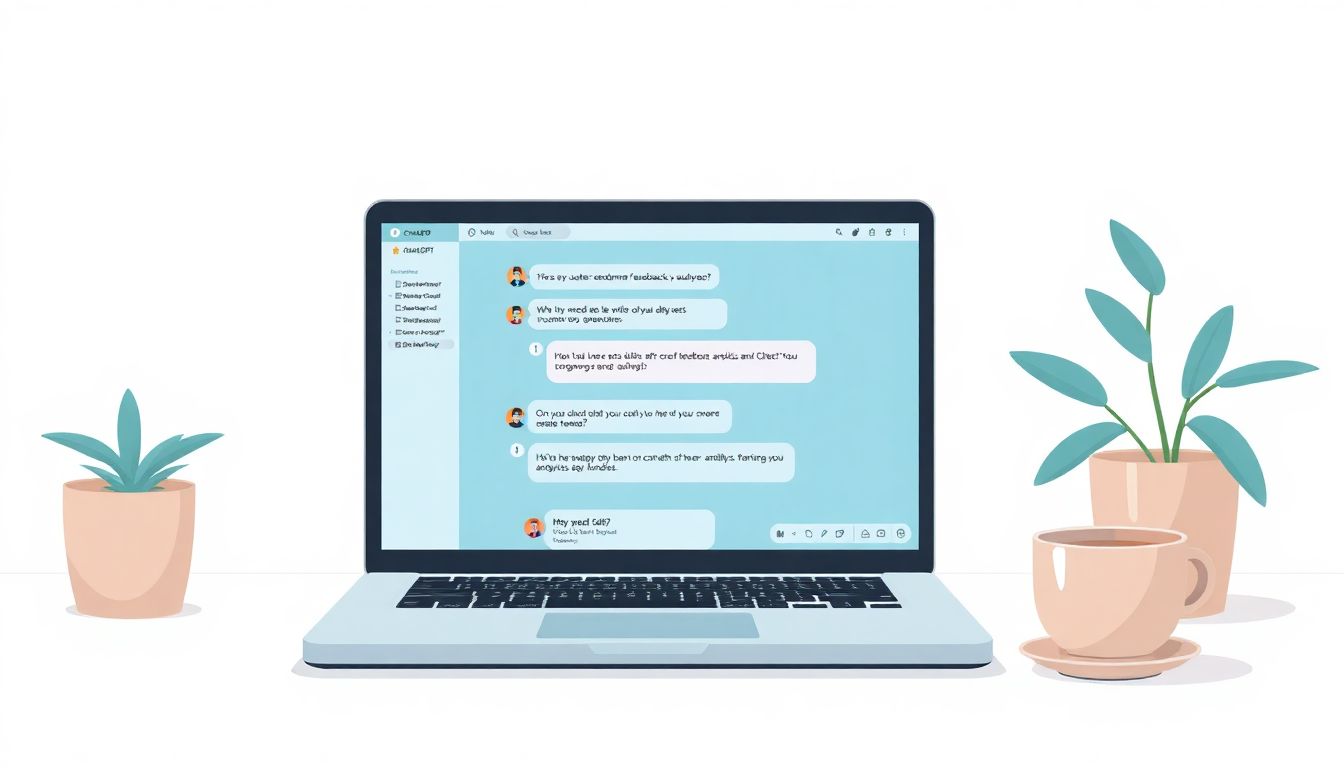You’re probably feeling overwhelmed by the entire lead nurturing process. It can be tricky to engage potential customers and keep them interested without being too pushy. Trust me, you’re not alone in this boat—many marketers face this challenge daily.
But what if I told you there’s a way to make this easier? By leveraging ChatGPT, you can streamline your interactions, automate crucial follow-ups, and create engaging content that speaks directly to your audience. Stick around, and you’ll discover some fantastic prompts that will transform your lead nurturing game.
From personalizing customer interactions to analyzing feedback, we’ll cover everything you need to know. Get ready to elevate your marketing strategy and watch your leads come to life!
Key Takeaways
- Lead nurturing can be simplified and improved with ChatGPT, helping to keep potential customers engaged without being pushy.
- Use effective prompts to automate follow-ups, create personalized messages, and streamline customer interactions.
- Automated follow-up messages enhance engagement, helping to build relationships and convert leads into customers.
- Engaging content is vital for nurturing campaigns; using ChatGPT can help generate ideas tailored to your audience’s needs.
- Crafting the right questions can qualify leads effectively, and ChatGPT aids in creating targeted inquiries.
- Analyzing customer feedback with ChatGPT can lead to actionable insights for product and service improvements.
- ChatGPT can provide 24/7 support to engage leads any time, enhancing their experience with your brand.
- Targeted marketing messages created with ChatGPT can resonate with specific customer segments, driving higher engagement and conversions.

Effective ChatGPT Prompts for Lead Nurturing
When it comes to lead nurturing, using effective ChatGPT prompts can significantly enhance your engagement strategies.
Employing AI-driven engagement not only streamlines your communications but also personalizes them for better customer relationship management.
Here are some effective prompts you can use with ChatGPT to nurture leads:
- “Generate a follow-up message for a potential client who showed interest in our service last week.”
- “Create a personalized email template that acknowledges a customer’s previous inquiries.”
- “Draft a message that encourages leads to schedule a demo based on their expressed interests.”
- “Suggest a series of texts for nurturing leads through the sales funnel over a month.”
These prompts help in automating the lead journey while providing personalized communication at each touchpoint.
Using ChatGPT to Personalize Customer Interactions
To personalize customer interactions, ChatGPT can be an invaluable tool in tailoring your messaging to fit each individual.
By employing AI personalization techniques, you can create engaging, interactive conversations that resonate with your audience.
Here are some prompts tailored for enhancing customer engagement:
- “Write a customized response for a customer asking about our service features.”
- “Generate a friendly and engaging chatbot greeting for new visitors on our website.”
- “Develop a personalized follow-up message based on a customer’s recent purchase.”
- “Create a list of questions that I can ask customers to better understand their needs in real time.”
Using these prompts allows for the creation of meaningful responses, improving customer relations and satisfaction.
Automating Follow-Up Emails with ChatGPT
Follow-up emails are key to maintaining engagement with your leads, and automating this process with ChatGPT can be a game changer.
By setting up automated lead communication sequences, you ensure timely follow-ups without the stress.
These prompts can assist you in crafting effective follow-up emails:
- “Create an automated follow-up email for leads who haven’t responded in three days.”
- “Draft a follow-up message for a customer who completed a purchase but hasn’t left feedback.”
- “Generate a series of email reminders for leads who have shown interest but haven’t converted yet.”
- “Develop an email sequence that nurtures leads with informative content about our products.”
These examples will help you create an effective email nurturing sequence that increases your chances of conversion.
Creating Engaging Content for Lead Nurturing Campaigns
Engaging content is crucial for lead nurturing campaigns; it keeps your brand relevant and helps build trust with potential customers.
With ChatGPT, you can brainstorm content ideas that resonate with your audience and enhance their journey.
Try using these prompts to create engaging content:
- “Suggest five blog post ideas that address common pain points for my target audience.”
- “What are some interactive content ideas that can engage users during a lead nurturing campaign?”
- “Write a compelling story that illustrates the benefits of our service for potential clients.”
- “Create a checklist of tips for customers that I can use as lead nurturing material.”
By generating engaging content, you keep potential customers informed and invested in your offerings.
If you’re interested in exploring more ways to leverage ChatGPT for different needs, check out our posts on ChatGPT for Marketing and How to Use ChatGPT Prompts for Landing Page Copy.

Tips for Crafting Questions to Qualify Leads with ChatGPT
Crafting the right questions can help you qualify leads effectively, and using ChatGPT for this can streamline the process.
Qualifying leads means identifying which prospects are genuinely interested in your product or service, and ChatGPT can assist with creating targeted questions.
Here are some actionable prompts you can use:
- “Generate five open-ended questions to ask potential clients about their needs.”
- “Create a lead qualification questionnaire tailored for my service offering.”
- “Draft specific demographic questions to help identify my ideal customer.”
- “Suggest questions to understand a lead’s budget constraints during our conversations.”
With these prompts, you can gather valuable insights that guide your lead nurturing strategies and increase your conversion rates.
Using ChatGPT to Analyze Customer Feedback for Improvement
Customer feedback is crucial for ongoing improvements, and analyzing it with ChatGPT can provide deeper insights.
Evaluating feedback helps you understand customer sentiment and areas that need enhancement.
Here are some helpful prompts you can use for analyzing feedback:
- “Summarize customer feedback from our latest survey to identify common themes.”
- “Analyze the sentiment of our social media comments over the last month.”
- “Generate a report highlighting positive and negative feedback for our recent product launch.”
- “Create a list of actionable steps based on the customer feedback we have received.”
Utilizing these prompts allows you to turn feedback into actionable insights that can significantly improve your products and services.
Setting Up ChatGPT for 24/7 Lead Support
Providing 24/7 support is essential for modern businesses, and ChatGPT can help automate lead assistance at any time.
Setting up an AI chatbot for constant availability enables you to engage with leads even outside normal business hours.
Here are some practical prompts to set up your ChatGPT for lead support:
- “Draft a comprehensive FAQ section for our website’s ChatGPT.”
- “Create a greeting message for leads starting a conversation with our ChatGPT.”
- “Generate responses for common customer inquiries based on our product catalog.”
- “Write a script for ChatGPT that guides prospects through their purchasing process.”
By implementing these prompts, you ensure that potential customers receive instant assistance and information at any hour, enhancing their experience with your brand.
Leveraging ChatGPT to Create Targeted Marketing Messages
Targeted marketing messages work wonders for conversions; they connect with your audience on a personal level.
With ChatGPT, you can create customized messages that resonate with specific customer segments.
Here are some prompts to help you craft these targeted messages:
- “Create a personalized email for potential customers who have previously engaged with our website.”
- “Draft a message targeting small businesses and how our product can benefit them.”
- “Generate an announcement for our latest product tailored to tech-savvy individuals.”
- “Write a social media post that addresses the concerns of first-time buyers.”
Using these prompts allows you to deliver relevant content that speaks directly to the needs of different customer segments, ultimately driving higher engagement and conversions.

Developing Customer Journey Maps with ChatGPT Prompts
Creating customer journey maps helps visualize the experiences of your leads and identifies areas for improvement.
With ChatGPT, you can generate prompts that guide you in developing comprehensive journey maps.
Here are some prompts to assist you in this process:
- “Draft a customer journey map that includes awareness, consideration, and decision stages.”
- “Identify key touchpoints in our customer journey and suggest improvements for each.”
- “Generate a template for mapping customer interactions across different channels.”
- “List common challenges customers face at each stage of their journey and propose solutions.”
Using these prompts, you can create insightful maps that enhance your understanding of the customer experience, leading to better engagement strategies.
FAQs
Effective prompts for lead nurturing include asking about customer preferences, feedback on services, or suggestions for improving experiences. Personalization in conversations can enhance engagement and lead to better conversion rates.
ChatGPT can generate personalized follow-up emails based on lead interactions and preferences. This ensures timely communication, increases engagement, and improves the likelihood of conversion without manual effort.
When qualifying leads, ask open-ended questions about their challenges, goals, and specific needs. This encourages dialogue and provides valuable insights to segment and prioritize leads effectively.
ChatGPT can process and categorize customer feedback to identify trends and areas for improvement. By summarizing key points, it enables businesses to make data-driven decisions that enhance the customer experience.
